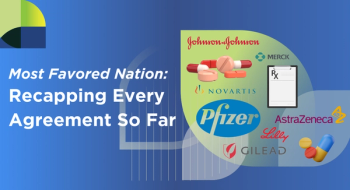
Pharmacy Week in Review: Anticholinergic Drugs Linked to Dementia, Cancer Cell Growth Mechanism Discovered
This weekly video program provides our readers with an in-depth review of the latest news, product approvals, FDA rulings, and more. Our Week in Review is a can't miss for the busy pharmacy professional.
This weekly video program provides our readers with an in-depth review of the latest news, product approvals, FDA rulings, and more. Our Week in Review is a can't miss for the busy pharmacy professional.
Transcript
Hello and welcome to the Pharmacy Times News Network. I’m Nicole Grassano your host for our Pharmacy Week in Review. There is emerging evidence that anticholinergic drugs might cause vascular dementia in people age 50 and older, who would otherwise not be expected to get dementia, Pharmacy Times reported. These drugs are often associated with short-term altered mental status, confusion, and memory loss and are therefore on the Beer’s list of drugs to avoid for patients 65 or older. It has also been observed that people who take cholinergic drugs for long periods have a higher rate of dementia. In the study that examined about 60,000 patients with dementia diagnoses, anticholingeric drugs were more likely to be associated with dementia than with Alzheimer disease and with a diagnosis before age 80. Researchers of this study concluded that exposure to several types of strong anticholinergic drugs is associated with an increased risk of dementia. These findings highlight the importance of reducing exposure to anticholinergic drugs in people who are middle-aged and older. The US Preventive Services Take Force has reaffirmed its 2009 recommendation to screen all pregnant women at their first prenatal visit for the hepatitis B virus, Contemporary Clinic reported. New evidence shows that rates of maternal HBV infection have increased annually by 5.5% since 1998, and infected infants are more likely to develop chronic infection. According to the task force, universal prenatal screening substantially reduces perinatal transmission of HBV and decreases the risk of infants developing chronic HBV infection. Health care professionals can play an integral role in monitoring and treating HBV-positive mothers and their infants, and case management for HBV-positive mothers should include HBV DNA viral load testing and referral to specialty care for counseling and medical treatment. Postexposure prophylaxis should be provided for infants born to infected mothers, which includes the hepatitis B vaccine and hepatitis B immune globulin within 12 hours of birth. An international team of researchers has discovered the energy production mechanism of cancerous cells that drives the growth of the nucleolus and causes tumors to rapidly multiply, Specialty Pharmacy Times reported. Researchers examined the energy pathways in malignant brain tumors and glioblastoma in animal models followed by cohort studies for human specimen. The results demonstrated an increased level of inosine monophosphate dehydrogenase in cancer cells. This has been found to accelerate the production of guanosine triphosphate, a nucleotide that is among the building blocks needed to create RNA, which is prevalent in cancerous cells. The discovery of this close relationship prompted researchers to develop a new method of metabolic analysis, thereby leading to the discovery of a clear correlation between the suppression of glioblastoma cell growth and inosine monophosphate dehydrogenase inhibition. Pharmacists may get more questions about Tremfya, if patients have seen a recent commercial for the prescription medication. In the spot, called “Get Clearer,” the narrator says that Tremfya was proven superior to Humira in providing significantly clearer skin in a study. According to the commercial, Tremfya is a prescribed medication that is intended to treat those who suffer from plaque psoriasis when taken regularly as ordered. For more great coverage and practical information for today’s pharmacist, visit our website and sign up for our Daily eNews. And don’t forget to follow us on Facebook, Twitter, and Instagram. Thanks for watching our Pharmacy Week in Review. I’m Nicole Grassano at the Pharmacy Times News Network.
Newsletter
Stay informed on drug updates, treatment guidelines, and pharmacy practice trends—subscribe to Pharmacy Times for weekly clinical insights.


























